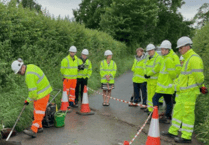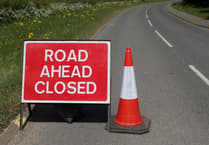A MORNING on Deer Park Farm in the Teign Valley reveals many of the problems, and solutions, to the future of farming.
When Audrey Compton and John Whetman first moved to Deer Park Farm over 20 years ago, they had a vision to farm differently. Even in the face of multiple financial and ecological challenges, Audrey and John wanted to build a farm that could function in harmony with the environment.
Audrey said: ’When I started farming in 1969, we didn’t realise that the government suggestions to farm more productively were doing such damage. And that’s the problem, when you start doing damage accidentally, that system can become entrenched. But it was an opportunity for me to look at what we were doing and change course, rather than having a debt to the environment.’
Over the following years, Audrey and John learned organic methods to farm their 120 acres of land sustainably, rotating the grazing patterns of their livestock to minimise the effect on the ecosystem.
Fertiliser and pesticides were dropped, new hedges grown and fields harvested less frequently. It was found that one of Deer Park Farm’s fields had over 90 species living on it.
Cutting through the centre of the farm sits a fragment of ancient woodland, one of the Devon Wildlife Trust’s first protected areas.
Audrey’s latest ambition has been to create habitats for skylarks, birds that were once common across the UK, but are now considered critically endangered by the RSPB.
‘This is my invention,’ said Audrey. ‘Each of these patches costs us at least £100 a year for us. But it works, and now we have five pairs of skylarks. If you asked if I wanted jewellery for my birthday or skylarks, I’d choose the skylarks!’
Much of what Deer Park Farm does is enabled by a variety of environmental grants and subsidies, without which, the farm would be bankrupt. Even so, Audrey found that the farm’s profits over 22 years averaged just £5,000 a year, or £1.40 an hour.
Moving forwards, the future of sustainable farming remains uncertain, as the old payment schemes are swept away for the new post-Brexit Environmental Land Management Scheme.
Audrey said: ‘The only advantage that farmers can get out of Brexit is this new way of getting paid, but only if the farmers were paid enough for it to be worthwhile. They may talk about new funding for looking after wildlife and for the so-called public goods. No point in saying that if the money doesn’t cover the work required.’
John added: ‘It all contributes to a feeling of uncertainty. The nature of farming means that farmers don’t live in the present but are looking into the future, but if we don’t know what’s happening in two years, there’s no way to plan.’
Like many farmers in Devon and the UK more widely, the uncertainty of the future leaves Audrey and John in a tricky position.
‘We have the future of the planet in our hands. Farmers have always been able to look ahead, but right now they’re massively constrained by the lack of clarity on what the government wants the future of the industry to look like.
‘This is not an ordinary farm, and we don’t expect other farms to do things just like us. We’re on one end of the spectrum while large-scale intensive farming is on the other. What I’d like to see is more overlap in the middle.’





Comments
This article has no comments yet. Be the first to leave a comment.